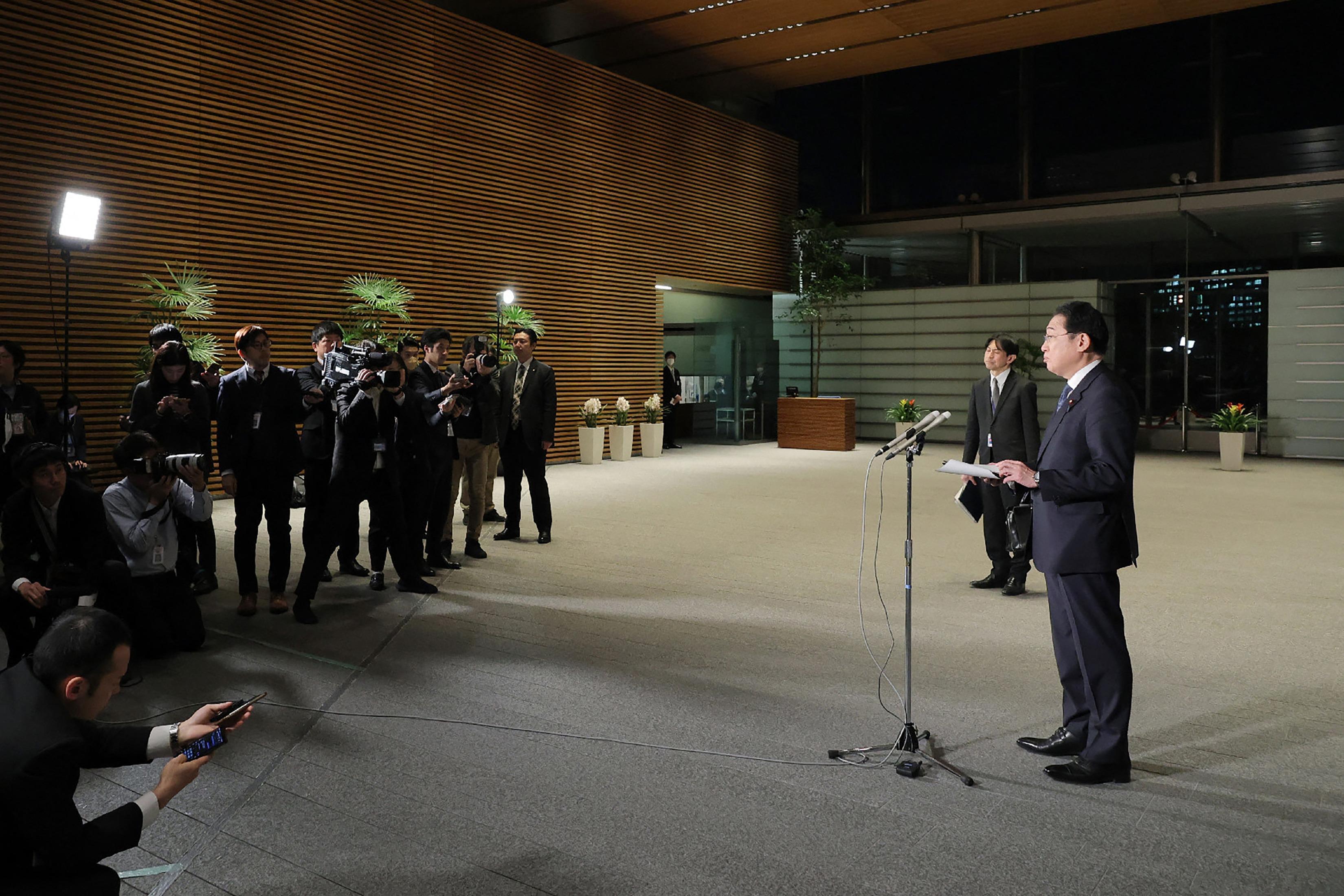With three factions set to disband, doubts arise on LDP’s internal power balance, Kishida team
 Japan's Prime Minister Fumio Kishida (right) answers questions from reporters at the prime minister's office in Tokyo on January 19, 2024. (PHOTO / AFP)
Japan's Prime Minister Fumio Kishida (right) answers questions from reporters at the prime minister's office in Tokyo on January 19, 2024. (PHOTO / AFP)
Dissolution of three factions in Japan’s ruling Liberal Democratic Party (LDP) will create ambiguity in the internal power balance of the party and heighten uncertainties in regard to the future of the Prime Minister Fumio Kishida’s Cabinet, experts said.
On Jan 19, the Abe and Nikai factions, two of the largest LDP factions — identified with the late former prime minister Shinzo Abe and the former LDP secretary-general Toshihiro Nikai, respectively — announced decisions to disband amid a slush funds scandal.
The announcements were made after Kishida said on Jan 18 that he is considering disbanding the Kishida faction, in response to the controversy surrounding the political funds scandal within LDP factions.
Allegations suggest that lawmakers affiliated with several LDP factions redirected funds exceeding the sales quota for party tickets back to the politicians as slush funds, with no record of the entire financial flow in the factions’ or their members’ financial statements.
The decisions to dissolve the three factions create ambiguity in the internal power balance of the LDP, said Ukeru Magosaki, a former senior official with Japan’s Ministry of Foreign Affairs.
“The future of the Kishida administration is extremely uncertain. Up until now, the Kishida administration has maintained a stable support base within the Liberal Democratic Party through cooperation with the largest faction, the Abe faction, which has 98 members. Other factions refrained from acting against Kishida, fearing their own exclusion. The decisions to dissolve the Abe, Nikai and Kishida factions raise uncertainty about power dynamics
within the LDP,” said Magosaki, co-representative of the Association for Inheriting and Propagating the Murayama Statement.
Public opinion, which had shown lukewarm support for Kishida, has cooled. Observing this, the move to dissolve the factions was initiated. The direction of public opinion is somewhat positive, but the outcome remains undecided, Magosaki said.
The Kishida Cabinet approval rating stood at 23 percent, according to a survey conducted by The Asahi Shimbun between Jan 20 and 21, unchanged from a previous survey in December. It is the lowest rating for any administration since the LDP returned to power in 2012, the Japanese national daily newspaper noted.
However, the United States views the Kishida administration, which fully accepts Washington’s requests, as highly desirable and intends to support it. At present, it is a challenge to accurately anticipate the future developments, Magosaki said.
If the three major factions were to disband, members left without a place to go are likely to either join a new faction taking the form of a study group initiated by non-affiliated members within the LDP or merge with the Taro Aso and Toshimitsu Motegi factions, which advocate maintaining their respective factions, said Kazuyuki Hamada, international political economy scholar and a former Japanese parliamentary vice-minister for foreign affairs.
Many incumbent members have been affiliated with factions in anticipation of election funds and party or ministerial posts. There are few members with a strong inclination toward independence. It would be difficult to break away from the factional politics that the LDP has built up over the years, Hamada said.
“In the subsequent LDP leadership election, Taro Aso, vice-president of the party, is expected to take charge and strengthen cooperation with the Motegi faction. Ultimately, it appears that the LDP is on the verge of a split,” he said.
“Even if the three LDP factions are dissolved, factions like the Aso faction will remain, making it a superficial and incomplete political renewal. With this approach, there is no expectation of support from voters.”
Seventy-two percent of voters said dissolution of factions in the LDP will not restore public trust in politics, the Asahi Shimbun survey showed.
“If the LDP genuinely desires to restore trust in politics, it must reform the electoral system, visibly eliminate hereditary succession and vested interests, and present a clear vision for creating Japan’s future in collaboration with the people,” Hamada said.
The political landscape of the LDP has established a dependency on funding from the business sector. This forms the foundation for the election campaigns of each member. Therefore, the inherent tendency to seek financial support from the business sector is unlikely to change by the party’s own initiative, said Magosaki, the former senior official with Japan’s Ministry of Foreign Affairs.
Opposition parties are calling for a tightening of the Political Funds Control Law, which is riddled with loopholes designed for securing secret funds.
“While there were brief discussions about abolishing political fundraising parties altogether, in the end, it amounted to little more than empty rhetoric. In essence, as long as the deeply ingrained culture of corruption persists, suggesting that under-the-table funds are indispensable for political survival, any political reforms based on mere slogans will end up as mere pie in the sky,” Hamada said.


